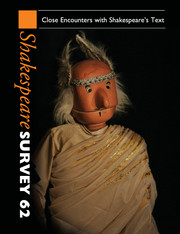Book contents
- Frontmatter
- Shakespeare, text and paratext
- The popularity of Shakespeare in print
- The continuing importance of new Bibliographical method
- ‘Honour the real thing’: Shakespeare, Trauma and Titus Andronicus in South Africa
- ‘O, these encounterers’: on Shakespeare’s meetings and partings
- A play of modals: Grammar and potential action in early Shakespeare
- Merry, marry, Mary: Shakespearian wordplay and Twelfth Night
- A subtle point: Sleeves, tents and ‘Ariachne’s broken woof’ (again)
- The look of Othello
- Red button Shakespeare
- ‘Mark you / his absolute shall?’: Multitudinous tongues and contested words in Coriolanus
- Chagall’s Tempest: An autobiographical reading
- Reading illustrated editions: Methodology and the limits of interpretation
- Close encounters with Anne Brontë's Shakespeare
- Shakespeare and the magic lantern
- Shakespeare and the coconuts: close encounters in post-apartheid South Africa
- The Schrödinger effect: Reading and misreading performance
- Behind the scenes
- Inner monologues: Realist acting and/as Shakespearian performance text
- More japanized, casual and transgender shakespeares
- Translation futures: Shakespearians and the foreign text
- After translation
- ‘The single and peculiar life’: Hamlet’s heart and the early modern subject
- Mapping King Lear
- ‘Last on the stage’: The place of Shakespeare in Charles Darwin’s ethology
- Sense/memory/sense-memory: Reading narratives of Shakespearian rehearsals
- Shakespeare performances in England (and Wales), 2008
- Professional Shakespeare productions in the British Isles, January–December 2007
- The Year's Contributions to Shakespearian Study 1 Critical Studies
- 2 Shakespeare in performance
- 3a Editions and textual studies
- 3b Editions and textual studies
- Index to Volume 62
A subtle point: Sleeves, tents and ‘Ariachne’s broken woof’ (again)
Published online by Cambridge University Press: 28 November 2009
- Frontmatter
- Shakespeare, text and paratext
- The popularity of Shakespeare in print
- The continuing importance of new Bibliographical method
- ‘Honour the real thing’: Shakespeare, Trauma and Titus Andronicus in South Africa
- ‘O, these encounterers’: on Shakespeare’s meetings and partings
- A play of modals: Grammar and potential action in early Shakespeare
- Merry, marry, Mary: Shakespearian wordplay and Twelfth Night
- A subtle point: Sleeves, tents and ‘Ariachne’s broken woof’ (again)
- The look of Othello
- Red button Shakespeare
- ‘Mark you / his absolute shall?’: Multitudinous tongues and contested words in Coriolanus
- Chagall’s Tempest: An autobiographical reading
- Reading illustrated editions: Methodology and the limits of interpretation
- Close encounters with Anne Brontë's Shakespeare
- Shakespeare and the magic lantern
- Shakespeare and the coconuts: close encounters in post-apartheid South Africa
- The Schrödinger effect: Reading and misreading performance
- Behind the scenes
- Inner monologues: Realist acting and/as Shakespearian performance text
- More japanized, casual and transgender shakespeares
- Translation futures: Shakespearians and the foreign text
- After translation
- ‘The single and peculiar life’: Hamlet’s heart and the early modern subject
- Mapping King Lear
- ‘Last on the stage’: The place of Shakespeare in Charles Darwin’s ethology
- Sense/memory/sense-memory: Reading narratives of Shakespearian rehearsals
- Shakespeare performances in England (and Wales), 2008
- Professional Shakespeare productions in the British Isles, January–December 2007
- The Year's Contributions to Shakespearian Study 1 Critical Studies
- 2 Shakespeare in performance
- 3a Editions and textual studies
- 3b Editions and textual studies
- Index to Volume 62
Summary
To observe that Troilus and Cressida is a play full of puns is hardly news: nearly two centuries ago, William Hazlitt described the whole play as ‘a kind of double entendre’, and at times it is a play which could well be summarized by that now passé bowdlerizing editorial shorthand, ‘with a bawdy quibble’. As Patricia Parker comments in the opening paragraph of Shakespeare from the Margins (1996), ‘Wordplay itself has frequently been reduced to the purely decorative “quibble”. . . [yet] both comic wordplay and what Kenneth Muir called the “uncomic pun” lead us to linkages operating not only within but between Shakespeare’s plays.’ Troilus and Cressida provides rich material for such an approach: its puns are dense and both uncomic and revoltingly (or even painfully) funny, and its quibbles are frequently not at all ‘quibbling’, but rather substantive, far-reaching and unsettling, a crucial part of the play’s thick verbal texture and unstable moral universe. They cannot be dismissed. Here I offer a close reading of one passage from the play, which pays attention not simply to quibbles, puns and other forms of linguistic play, but also to the material context of the passage, in terms of both performance issues and early modern material culture. We are getting better at attending to the material circumstances of performance, at considering what impact such awareness might have upon the more purely linguistically oriented close reading of texts, and, indeed, at breaking down the distinctions between ‘text’ and ‘performance’. But the degree of slippage between the categories of the verbal, the visual and the material in Troilus and Cressida can still take us by surprise by showing that there could be a pun on a thing, or a quibble that is in part material. Such fluidity and expansiveness of interpretation seem to have been second nature to Shakespeare and his audience.
- Type
- Chapter
- Information
- Shakespeare Survey , pp. 92 - 103Publisher: Cambridge University PressPrint publication year: 2009



